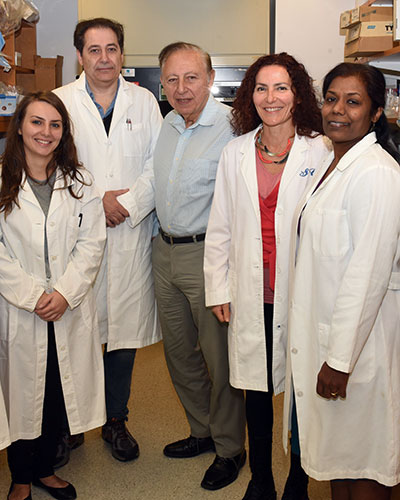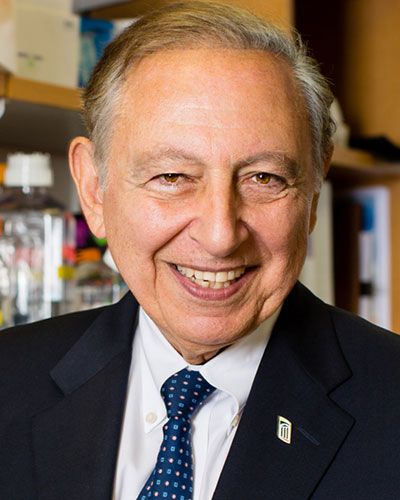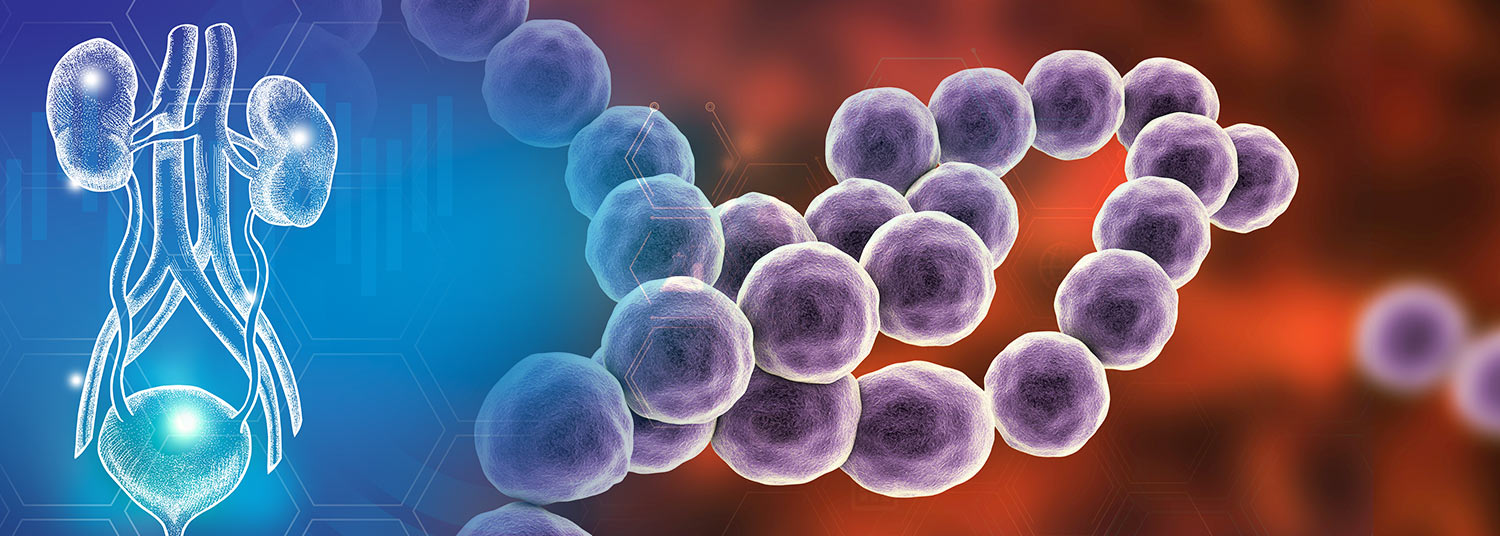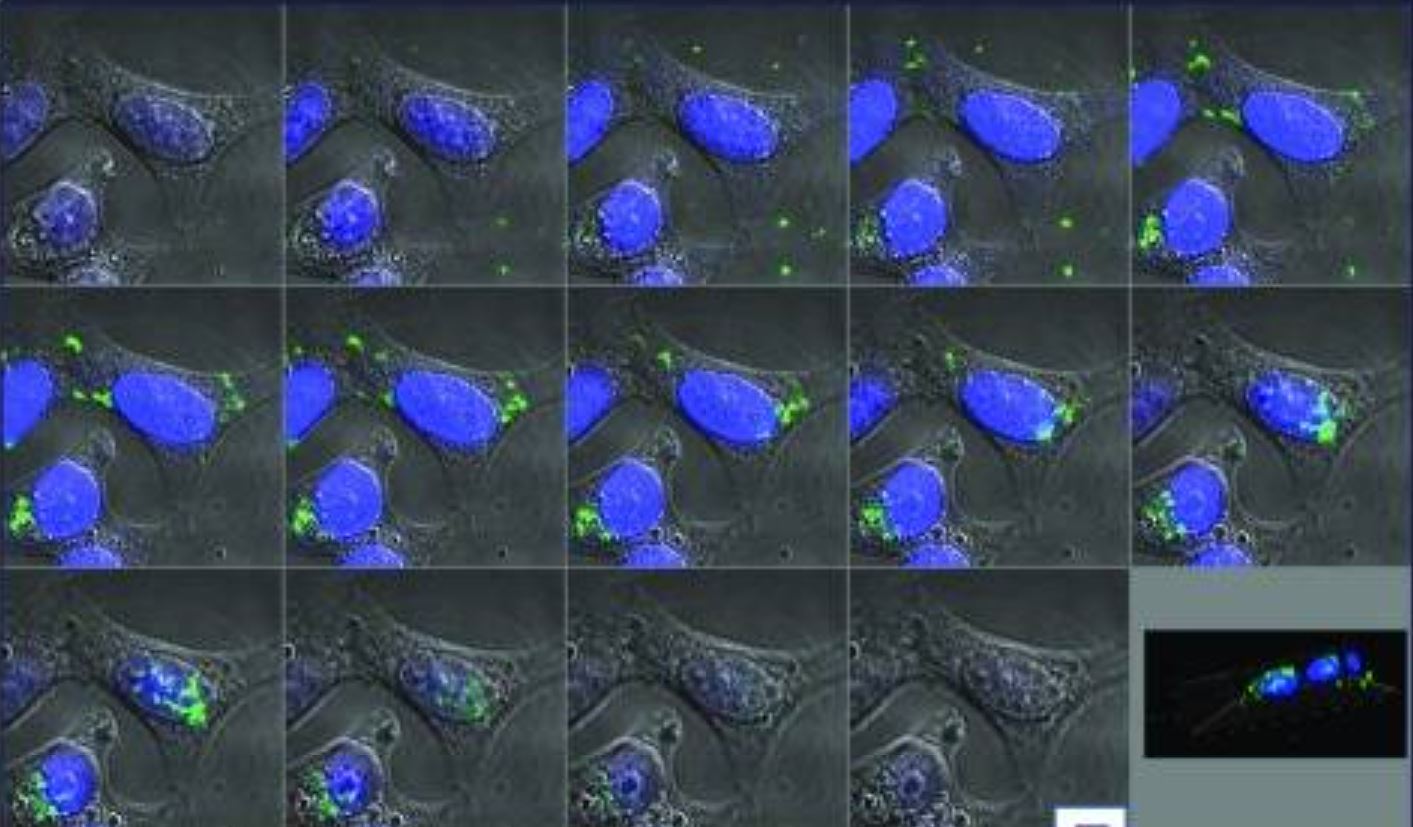July 17, 2023
Study Underscores Significant Implications for Cancer and Obstetrics Medicine, as well as Diagnostics, and Preventative Therapy
A team of researchers from the University of Maryland School of Maryland’s (UMSOM) Institute of Human Virology (IHV), a Center of Excellence of the Global Virus Network (GVN), published new findings that emphasize the crucial role of the urinary and genital tract microbiota in adverse pregnancy outcomes and genomic instability that originate in the womb during fetal development.
 The study, published on July 17 in the Proceedings of the National Academy of Sciences of the United States of America (PNAS), established a new link between genomic instability, reduced fertility, and a protein from Mycoplasma fermentans, a kind of bacterium that commonly colonizes the urogenital tract in humans.
The study, published on July 17 in the Proceedings of the National Academy of Sciences of the United States of America (PNAS), established a new link between genomic instability, reduced fertility, and a protein from Mycoplasma fermentans, a kind of bacterium that commonly colonizes the urogenital tract in humans.
This research was spearheaded by Davide Zella, PhD, Assistant Professor of Biochemistry and Molecular Biology at UMSOM’s IHV and Robert Gallo, MD, The Homer & Martha Gudelsky Distinguished Professor in Medicine, Co-Founder and Emeritus Director of UMSOM’s IHV, and Co-Founder and Chair of the Scientific Leadership Board of the Global Virus Network.
"Our results not only broaden our understanding of the interplay between the urogenital tract microbiota and human reproductive health, but also shed light on the previously unidentified contribution of the human microbiota to genetic abnormalities," said co-lead author on the study Francesca Benedetti, PhD, Research Associate of Biochemistry and Molecular Biology in UMSOM’s IHV.
“We aim to further explore the mechanisms underlying these findings and their potential implications for preventing and treating chromosomal abnormalities and genetic diseases,” said co-lead author Giovannino Silvestri, PhD, former Research Associate of Medicine in UMSOM’s IHV.
The human microbiota is known to affect metabolism, susceptibility to infectious diseases, immune system regulation, and more. One of these bacterial components, Mycoplasmas, have been linked to various cancers.
The research team has been studying one Mycoplasma protein, DnaK, which belongs to a family of proteins that safeguards other bacterial proteins against damage and aids in their folding when they are newly made, acting as a so-called ‘chaperone.’ However, while this protein is advantageous for bacteria, its effects on animal cells are less favorable. To this regard, the team had previously demonstrated that this DnaK is taken up by the body’s cells and it interferes with key proteins involved in preserving DNA integrity and in cancer prevention, such as the tumor suppressor protein p53.
For this latest study, researchers created mice that make the DnaK protein normally produced by the bacterium Mycoplasma fermentans. These mice with exposure to DnaK accrued genomic instability in which entire sections of the genome were duplicated or deleted, resulting in mice with varying numbers of copies of certain genes.
The team noticed that some of these mice from 3-5 weeks of age had problems with movement and coordination. They found that these mice have a deletion in the Grid2 gene, which in humans leads to the rare genetic disease known as spinocerebellar ataxia-18 (SCAR18) that causes delayed development of skilled movements and intellectual disabilities.
“Remarkably, this instance marks the first time a mouse model successfully recapitulated a human genetic disease de novo, showcasing this model's potential for further cancer biology research,” said Dr. Zella.
More than a third of the female mice that made the DnaK protein were unable to get pregnant. Additionally, more than 20 percent of the pups born from moms with the DnaK protein had some sort of birth defect/deformity.
 “The occurrences of genomic instability, in the form of increased number of copy number variations, could explain the decreased fertility and the increased instances of abnormally developed fetuses we observed upon DnaK exposure,” said Dr. Gallo. “These data build upon our initial work which discovered the disruptive role of DnaK on key proteins involved in the proper repair of damaged DNA, which are also known to play a role in the onset of copy number variations. Our ongoing commitment is to better understand the potential implications of these findings in cellular transformation and cancer.”
“The occurrences of genomic instability, in the form of increased number of copy number variations, could explain the decreased fertility and the increased instances of abnormally developed fetuses we observed upon DnaK exposure,” said Dr. Gallo. “These data build upon our initial work which discovered the disruptive role of DnaK on key proteins involved in the proper repair of damaged DNA, which are also known to play a role in the onset of copy number variations. Our ongoing commitment is to better understand the potential implications of these findings in cellular transformation and cancer.”
UMSOM Dean Mark T. Gladwin, MD, who is also Vice President for Medical Affairs, University of Maryland, Baltimore and the John Z. and Akiko K. Bowers Distinguished Professor, commended the work. “The researchers raise a significant question regarding whether DnaK can interfere with fetal development in humans. An important next step would be to investigate whether neutralizing either the bacteria or this protein could preserve fertility and prevent certain birth defects,” he said.
About the Institute of Human Virology
Formed in 1996 as a partnership between the State of Maryland, the City of Baltimore, the University System of Maryland, and the University of Maryland Medical System, the IHV is an institute of the University of Maryland School of Medicine and is home to some of the most globally-recognized and world-renowned experts in all of virology. The IHV combines the disciplines of basic research, epidemiology, and clinical research in a concerted effort to speed the discovery of diagnostics and therapeutics for a wide variety of chronic and deadly viral and immune disorders, most notably HIV, the virus that causes AIDS. For more information, visit ihv.org and follow us on Twitter @IHVmaryland.
About the University of Maryland School of Medicine
Now in its third century, the University of Maryland School of Medicine was chartered in 1807 as the first public medical school in the United States. It continues today as one of the fastest growing, top-tier biomedical research enterprises in the world -- with 46 academic departments, centers, institutes, and programs, and a faculty of more than 3,000 physicians, scientists, and allied health professionals, including members of the National Academy of Medicine and the National Academy of Sciences, and a distinguished two-time winner of the Albert E. Lasker Award in Medical Research. With an operating budget of more than $1.2 billion, the School of Medicine works closely in partnership with the University of Maryland Medical Center and Medical System to provide research-intensive, academic and clinically based care for nearly 2 million patients each year. The School of Medicine has nearly $600 million in extramural funding, with most of its academic departments highly ranked among all medical schools in the nation in research funding. As one of the seven professional schools that make up the University of Maryland, Baltimore campus, the School of Medicine has a total population of nearly 9,000 faculty and staff, including 2,500 students, trainees, residents, and fellows. The combined School of Medicine and Medical System ("University of Maryland Medicine") has an annual budget of over $6 billion and an economic impact of nearly $20 billion on the state and local community. The School of Medicine, which ranks as the 8th highest among public medical schools in research productivity (according to the Association of American Medical Colleges profile) is an innovator in translational medicine, with 606 active patents and 52 start-up companies. In the latest U.S. News & World Report ranking of the Best Medical Schools, published in 2021, the UM School of Medicine is ranked #9 among the 92 public medical schools in the U.S., and in the top 15 percent (#27) of all 192 public and private U.S. medical schools. The School of Medicine works locally, nationally, and globally, with research and treatment facilities in 36 countries around the world. Visit medschool.umaryland.edu.
Contact
Institute of Human Virology
Nora Samaranayake
Chief Communications & Public Affairs Officer
(443) 823-0613 (phone)
(410) 706-1952 (fax)
nsamaranayake@ihv.umaryland.edu
Related stories

Tuesday, December 04, 2018
Institute of Human Virology Researchers Discover That a Bacterial Protein Promotes Cancer
The Institute of Human Virology (IHV) at the University of Maryland School of Medicine (UMSOM) announced today the discovery that DnaK, a protein of the bacterium mycoplasma, interferes with the mycoplasma-infected cell’s ability to respond to and repair DNA damage, a known origin of cancer.

Wednesday, September 19, 2018
Institute of Human Virology (IHV) Awarded $12M to Combat Opioid Epidemic Through Clinical Research Trials
The Institute of Human Virology (IHV) at the University of Maryland School of Medicine will lead a $12 million dollar project to improve the morbidity and mortality of people with opioid use disorder (OUD). Utilizing a novel compound, IHV researches will implement a series of investigations, entitled SEARCH, to evaluate the underlying mechanisms of craving reduction as a strategy to prevent opioid misuse, dependence, and relapse. The grant is awarded through the National Institutes of Health’s (NIH) Helping to End Addiction Long-term (HEAL) Initiative, made possible through groundbreaking funding from the U.S. Congress.

Wednesday, November 29, 2017
To Mark World AIDS Day, Institute of Human Virology Releases Video on Dr. Robert Gallo
The Institute of Human Virology (IHV) at the University of Maryland School of Medicine (UMSOM) released a video on Dr. Robert Gallo, a trailblazer in HIV research, in advance of World AIDS Day, December 1. While many know Dr. Gallo for his pioneering work in AIDS research, the short video focuses on Dr. Gallo’s life and legacy in its entirety, including his pioneering discovery of human retroviruses.

Tuesday, October 25, 2016
"A Call to End HIV/AIDS in America" IHV Director Dr. Robert Gallo's Op-Ed in the Huffington Post
As the new Administration is presented with great challenges facing the United States, one will be a longtime foe, the U.S. HIV/AIDS epidemic. Since President Barack Obama was elected in 2008, I have publicly called on our country’s leaders to utilize the largest global health initiative in history - the President’s Emergency Plan for AIDS Relief (PEPFAR) - as a model to address the U.S. epidemic.

Monday, August 22, 2016
Institute of Human Virology (IHV) Awarded $14.4M for HIV Vaccine Research
The Institute of Human Virology (IHV) announced a $14.4M grant from NIAID to advance HIV vaccine research to solve a major challenge: produce long-lasting antibodies to protect against HIV infection.

Thursday, March 10, 2016
UM SOM Establishes Two Endowed Professorships Through Private Gifts and Matching State Funds
University of Maryland School of Medicine (UM SOM) Dean E. Albert Reece, MD, PhD, MBA, announced today that the School has been awarded matching funds from the Maryland Department of Business and Economic Development (DBED) as part of the Maryland E-Nnovation Initiative Fund program. The funds, when combined with private philanthropy, will enable UM SOM to establish two new endowed professorships – one in human virology and vaccine development, the other in surgical science and entrepreneurship.


